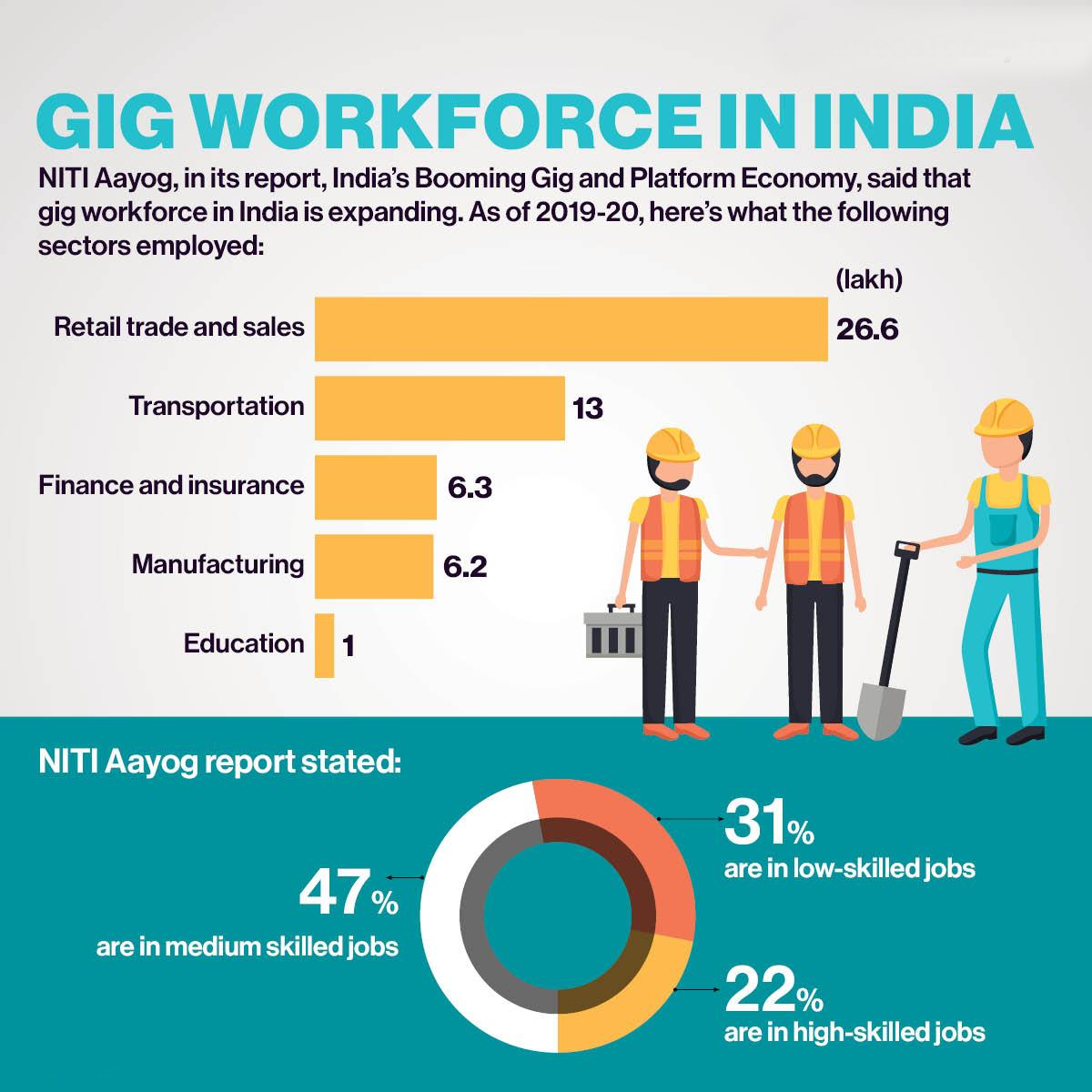Gig Workers’ Rights | 23 Jan 2023
For Prelims: Gig Economy, Unorganised Workers Social Security Act 2008, Supreme Court, High-speed internet, Covid-19 pandemic, Pension schemes, Digital Divide, Social Security.
For Mains: Growth Drivers of the Gig Economy in India, Issues Related to Gig Workers in India.
Why in News?
On September 20, 2021, the Indian Federation of App-based Transport Workers, on behalf of gig workers, filed a public interest litigation in the Supreme Court demanding that the Union government provide succour to workers affected by the pandemic.
- The petition has asked for ‘gig workers’ and ‘platform workers’ to be declared as ‘unorganised workers’ so they come under the purview of the Unorganised Workers Social Security Act, 2008.
What is the Gig Economy?
- About:
- A Gig economy is a free market system in which temporary positions are common and organisations contract with independent workers for short-term engagements.
- Gig Worker: A person who performs work or participates in a gig work arrangement and earns from such activities outside of traditional employer-employee relationship.
- A Gig economy is a free market system in which temporary positions are common and organisations contract with independent workers for short-term engagements.
- Growth Drivers of the Gig Economy in India
- Rise of the Internet and Mobile Technology: The widespread adoption of smartphones and the availability of high-speed internet has made it easier for workers and businesses to connect through online platforms, facilitating the growth of the gig economy.
- Economic Liberalisation: The Indian government's economic liberalisation policies have led to increased competition and a more open market, which has encouraged the growth of the gig economy.
- Increasing Demand for Flexible Work: The gig economy is particularly attractive for Indian workers who are looking for flexible work arrangements that allow them to balance their personal and professional lives.
- Demographic Factors: The gig economy is also driven by the large and growing number of young, educated and ambitious Indians who are seeking to improve their livelihoods with side income generation.
- Case of China:
- In China, the government's scrutiny over food delivery platforms has increased amidst public discourse. This was especially the case in Wuhan, the Covid-19 pandemic’s epicentre, where there was a clear transition of social discourse in favour of delivery workers.
- In July 2021, seven government agencies of Chna jointly passed guidelines that called for better protection of food delivery workers' rights in areas including salaries, workplace safety, working environment and dispute settlement.
- Issues Related to Gig Workers in India:
- Lack of Job and Social Security: Many gig workers in India are not covered by labour codes and do not have access to benefits such as health insurance and retirement plans.
- Additionally, gig workers often do not receive the same level of protection as traditional employees in the event of injury or illness.
- Digital Divide: The gig economy heavily relies on technology and internet access, this creates a barrier for those who lack access to these resources, and further exacerbates income inequality.
- Lack of Data: There is a lack of data and research on the gig economy in India which makes it difficult for policy makers to understand its size, scope, and impact on the economy and workforce.
- Exploitation by Companies: Gig workers in India are often paid less than traditional employees and may not have the same legal protections.
- Some companies may also exploit gig workers by misclassifying them as independent contractors to avoid liability and avoid paying taxes.
- Lack of Job and Social Security: Many gig workers in India are not covered by labour codes and do not have access to benefits such as health insurance and retirement plans.
Way Forward
- Social Security Blanket: The government should ensure that gig workers have access to social security programs such as pension schemes and health insurance to ensure financial security for older workers.
- Also, gig workers should be granted the same labour rights as traditional employees, including the right to organise and form unions.
- Education and Training: The government should invest in education and training programs for gig workers to improve their skills and increase their earning potential.
- Encourage Fair Competition and Innovation: Government can encourage fair competition by having regulations that prevent companies from misclassifying workers as independent contractors and by enforcing fair trade practices.
UPSC Civil Services Examination, Previous Year Question:
Q. Examine the role of ‘Gig Economy’ in the process of empowerment of women in India. (2021)

